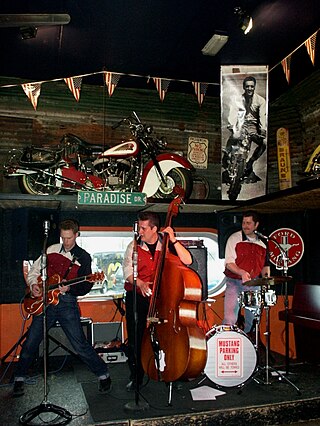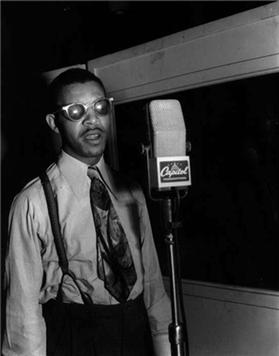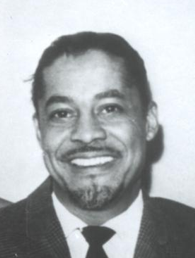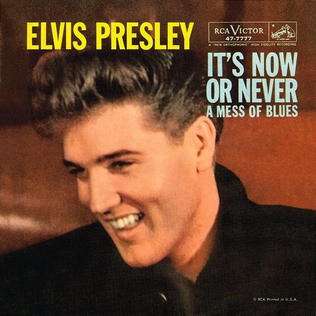Related Research Articles

Wynonie Harris was an American blues shouter best remembered as a singer of upbeat songs, featuring humorous, often ribald lyrics. He had fifteen Top 10 hits between 1946 and 1952. Harris is attributed by many music scholars to be one of the founding fathers of rock and roll. His "Good Rocking Tonight" is mentioned at least as a precursor to rock and roll.

Rockabilly is one of the earliest styles of rock and roll music. It dates back to the early 1950s in the United States, especially the South. As a genre, it blends the sound of Western musical styles such as country with that of rhythm and blues, leading to what is considered "classic" rock and roll. Some have also described it as a blend of bluegrass with rock and roll. The term "rockabilly" itself is a portmanteau of "rock" and "hillbilly", the latter a reference to the country music that contributed strongly to the style. Other important influences on rockabilly include western swing, boogie-woogie, jump blues, and electric blues.

Joseph Amos Milburn was an American R&B singer and pianist, popular in the 1940s and 1950s. One commentator noted, "Milburn excelled at good-natured, upbeat romps about booze and partying, imbued with a vibrant sense of humour and double entendre, as well as vivid, down-home imagery in his lyrics."

David Louis Bartholomew was an American musician, bandleader, composer, arranger, and record producer. He was prominent in the music of New Orleans throughout the second half of the 20th century. Originally a trumpeter, he was active in many musical genres, including rhythm and blues, big band, swing music, rock and roll, New Orleans jazz, and Dixieland. In his induction into the Rock and Roll Hall of Fame, he was cited as a key figure in the transition from jump blues and swing to R&B and as "one of the Crescent City's greatest musicians and a true pioneer in the rock and roll revolution".

Albert George Hibbler was an American baritone vocalist, who sang with Duke Ellington's orchestra before having several pop hits as a solo artist. Some of Hibbler's singing is classified as rhythm and blues, but he is best seen as a bridge between R&B and traditional pop music. According to one authority, "Hibbler cannot be regarded as a jazz singer but as an exceptionally good interpreter of twentieth-century popular songs who happened to work with some of the best jazz musicians of the time."

Floyd Cramer was an American pianist who became famous for his use of melodic "whole-step" attacks. He was inducted into both the Country Music Hall of Fame and the Rock and Roll Hall of Fame. His signature playing style was a cornerstone of the pop-oriented "Nashville sound" of the 1950s and 1960s. Cramer's "slip-note" or "bent-note" style, in which a passing note slides almost instantly into or away from a chordal note, influenced a generation of pianists. His sound became popular to the degree that he stepped out of his role as a sideman and began touring as a solo act. In 1960, his piano instrumental solo, "Last Date" went to number two on the Billboard Hot 100 pop music chart and sold over one million copies. Its follow-up, "On the Rebound", topped the UK Singles Chart in 1961. As a studio musician, he became one of a cadre of elite players dubbed the Nashville A-Team and he performed on scores of hit records.

"Tell Me Why" is a popular song, written by Titus Turner in 1956. It is a slow, strong rhythm and blues ballad, and has a melody reminiscent of "Just a Closer Walk with Thee". The first hit version was by Marie Knight, a black R&B singer, on the Mercury's subsidiary label, Wing. It was a local hit in New Orleans and Texas.
"It's a Sin to Tell a Lie" is a 1936 popular song written by Billy Mayhew, introduced early that year on records by many dance bands including Dick Robertson on the 78rpm record Champion 40106, and later popularized by Fats Waller on Victor 25342 and re-issued on Victor 20-1595. It was recorded in French by Cajun singer Cléoma Breaux in 1936 or 1937. Four further recordings of the song were made in 1936, namely by Freddy Ellis and His Orchestra (April), Victor Young and His Orchestra (April), Elton Britt (September), Roy Smeck and His Serenaders and Vera Lynn.

Ernest Aaron Freeman was an American pianist, organist, bandleader, and arranger. He was responsible for arranging many successful rhythm and blues and pop records from the 1950s to the 1970s.
"One Night" is a song written by Dave Bartholomew, Pearl King, and Anita Steiman. It originally was an R&B hit for Smiley Lewis in 1956, before being recorded with greater commercial success by Elvis Presley in 1958.

Allen Rathel Bunn, who was sometimes credited as Alden Bunn and who performed as Tarheel Slim, was an American singer, guitarist and songwriter whose work spanned gospel, blues, doowop, R&B, pop, and rockabilly. After singing in various gospel groups he became a member of The Larks before recording with his wife Anna Lee "Little Ann" Sandford, and then as a solo performer.
James William Gilreath was an American pop singer and songwriter, whose single "Little Band of Gold" went to #21 on the Billboard Hot 100 chart in 1963.
"It's Just a Matter of Time" is a Pop song written by Brook Benton, Clyde Otis, and Belford Hendricks. The original recording by Benton topped the Billboard Hot R&B Sides chart in 1959 and peaked at No. 3 on the Hot 100 pop chart, the first in a string of hits for Benton that ran through 1970.

"It's Now or Never" is a song recorded by Elvis Presley and released as a single in 1960. The song is one of the best-selling singles by Presley, and one of the best-selling physical singles of all time. It was recorded by Bill Porter at RCA Studio B in Nashville. It is written in E major and has a tempo of 80 BPM.

"Hurt" is a 1954 song by Jimmie Crane and Al Jacobs. "Hurt" was originally performed by Roy Hamilton, whose version peaked at number eight on the R&B Best Seller chart and spent a total of seven weeks on the chart. A version by Ricky Denell also received considerable radio airplay in 1954 on pop radio stations. The song is considered to be the signature hit of Timi Yuro, whose version went to number four on the Billboard pop chart in 1961. Elvis Presley’s 1976 version reached the top 40 on the Billboard Hot 100 and the top 10 on Billboard’s Hot Country Singles chart. Juice Newton's 1985 version scored number one on Billboard's Country chart.
Titus Lee Turner was an American R&B and East Coast blues singer and songwriter. His best-remembered recordings are "We Told You Not to Marry" and "Sound-Off". He also wrote "Leave My Kitten Alone", "Sticks and Stones" and "Tell Me Why".
"It's Too Soon to Know" is an American doo-wop ballad by Deborah Chessler (1923–2012), performed first by The Orioles. It was number one on the American Rhythm and blues charts in November 1948. It is considered by some to be the first "rock and roll" song, and described by others as "the first rhythm and blues vocal group harmony recording".

The singles discography of Elvis Presley began in 1954 with the release of his first commercial single, "That's All Right". Following his regional success with Sun Records, Presley was signed to RCA Victor on November 20, 1955. Presley's first single with RCA, "Heartbreak Hotel", was a worldwide hit, reaching the No. 1 position in four countries and the top 10 in many other countries. Other hit singles from the 1950s include "I Want You, I Need You, I Love You", "Don't Be Cruel", "Hound Dog", "Love Me Tender", "Too Much", "All Shook Up", "(Let Me Be Your) Teddy Bear", "Jailhouse Rock", "Don't", "Wear My Ring Around Your Neck", "Hard Headed Woman", "One Night", "(Now & Then There's) A Fool Such as I", and "A Big Hunk o' Love". On March 24, 1958, Presley entered the United States Army at Memphis, Tennessee, and was stationed in Germany. He left active duty on March 5, 1960.
Edwin Leon Chamblee, known as Eddie "Long Gone" Chamblee, was an American tenor and alto saxophonist, and occasional vocalist, who played jazz and R&B.

In the Still of the Night is an album by American pop singer Johnny Mathis that was released on August 8, 1989, by Columbia Records and continues the trend that began with his 1986 collaboration with Henry Mancini, The Hollywood Musicals, in that the project is devoted to a specific theme that ties the songs together. Mathis hints at the theme for this album in the liner notes for his 1993 box set The Music of Johnny Mathis: A Personal Collection, where he gives his thoughts on the 1964 Little Anthony and the Imperials song "I'm on the Outside Looking In" that he covered for his 1988 album Once in a While: "That was group singers' kind of material. I was singing other stuff. It wasn't the picture of the lone crooner standing in the spotlight. That's what I was doing when all this other stuff was going on. I never listened to it until it was brought to my attention by [that album's producers] Peter Bunetta and Rick Chudacoff." Mathis chose to continue his work with Bunetta and Chudacoff on this project, which focuses on "this other stuff" that Mathis refers to: pop and R&B hits from the 1950s and 1960s.
References
- 1 2 3 4 5 6 7 Biography by Dik de Heer at Black Cat Rockabilly. Retrieved April 20, 2013
- 1 2 3 Nick Talevski, Rock Obituaries – Knocking On Heaven's Door, Omnibus Press, 2010, p.344
- 1 2 Biography by Rovi at Allmusic.com. Retrieved April 20, 2013
- 1 2 Greil Marcus, Dead Elvis: a chronicle of a cultural obsession, Harvard University Press, 1999, pp.100–103
- ↑ Whitburn, Joel (1996). Top R&B/Hip-Hop Singles: 1942–1995. Record Research. p. 253.
- ↑ Sonny Knight at 45cat.com. Retrieved April 20, 2013
- ↑ Sonny Knight at Discogs.com. Retrieved April 20, 2013
- ↑ Whitburn, Joel (2003). Top Pop Singles 1955–2002 (1st ed.). Menomonee Falls, Wisconsin: Record Research Inc. p. 390. ISBN 0-89820-155-1.
- ↑ Google Books, The Day the Music Died